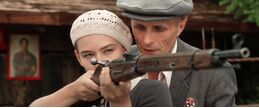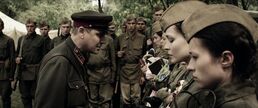Who are you welcoming the warm dawn with?
01
The first question that this movie caused me to think about was the simplicity of the complex in special situations.
During Liudmila's half-year sniper training, a female student was crawling in the mud to tear off a corner of her silk underwear. The instructor ordered all the female students to hand over silk underwear, dolls, satin soft shoes and other items. .
When these things that represent beauty, pleasure, and romance were burnt together, no one objected or resisted, and everyone accepted it silently and calmly. Of course, no one dared to oppose the superior's opinion lightly during the war. However, how did they digest and accept this in their hearts?
Bullets on the battlefield have no eyes, no distinction between men and women, no distinction between beauty and ugliness. All things and items that don't improve kill ability and defense ability are cleared.
In a time of peace, will there be times when we need to consider " what is most important" and "what to give up" ?
Sometimes Tachibana feels that the world around her is absurd.
I see people who spend a lot of money and time playing with their pet cats and dogs, and people who don't care about their parents, wives and children and stick to their jobs in other places.
I see people who do their homework carefully to distinguish the slight differences in lipstick shades, and people who don't understand modern medicine after illness and pin their hopes on some miraculous herbs with special effects.
I saw people carrying LV and HERMES on their backs, and felt that the examination of hundreds of dollars was too expensive and unnecessary. I saw that when I was seriously ill and needed to take medicine, I was still struggling with the "possible" side effects of the medicine, such as skin spots, loss of hair volume, etc.
There is also this famous official who insisted on asking nurses to clean toilets during the hospitalization of new coronary pneumonia.
Are they confused about "what's more important" or are they unaware that they are in a "special situation"?
Wars and outbreaks of large-scale infectious diseases can clearly make the collective aware of the arrival of special times. For individuals, can we identify "special situations" and quickly switch thinking patterns to simplify the complexities?
Many people take it for granted, thinking that their mundane and trivial day-to-day life will last forever, unchanged for 10,000 years.
02
The second question that this film got me thinking was about post-traumatic healing.
On the battlefield, Lyudmila was buried in sand, was hit by bomb fragments, was in a deep coma, suffered a concussion... Her body suffered a lot, and her back was covered with scars.
In addition to bloodshed, Lyudmila also shed tears.
The first sniper partner died in battle while she was recuperating from injuries. Before she fully recovered, she volunteered to go to the front line and kill the enemy for revenge.
The second sniper partner is also her lover. When the two were on a mission together, the partner stepped on a mine and was seriously injured to cover Lyudmila. Lyudmila, who was slightly injured, returned to the camp with her blood-covered partner on her back, but died after treatment failed.
At this time, in order to boost morale, the organization decided to shoot and promote Lyudmila. They roughly pulled her from the hospital bed, put on a military uniform, stuffed her with a rifle, and demanded that the exhausted her "be more cheerful".
Lyudmila was then sent to the front to face off against top snipers sent by the enemy. After waiting in an ambush all night, she found that her wound was bleeding again. She wiped blood on her forehead and took the initiative to reveal her position. The enemy sniper and her fired at the same time, and both sides shot at each other, killing one and injuring the other.
The surviving Lyudmila walked over to look at the other party's relics and found the wedding photos and letters in her arms. She closed her eyes for the other party. " Poor the Bone by the Uncertain River, I'm still a girl in a spring boudoir's dream ." At this moment, what is the feeling of Lyudmila, who just lost her lover?
Lyudmila could not change the situation of the battle. When the top military evacuated from Sevastopol, they planned to take away party representatives, military doctors and other personnel, not including the injured Lyudmila.
Because the military doctor has always admired Lyudmila, he gave her his passport. She survived, and most of the others remained in Sevastopol forever.
03
How can a person be resilient in order to survive loneliness, grief, and pain, and to live strong after the deaths of partners and lovers around them one after another?
In European and American films, the person's pain, trauma, and depression, alcoholism and drug addiction, seeing a psychiatrist, joining a certain religion, and even committing suicide may be described in great detail.
Even in the domestic "Youth", He Xiaoping, who was turned from the rear art troupe to a field nurse, was once mentally ill.
In some settings, good psychotherapy is expensive and scarce, drug use is a crime, and people who have been raised in Marxist-Leninist materialism are essentially non-religious. So, what other paths can help us through this difficult psychological repair road?
How did Lyudmila do it? More than a month after retreating from the battlefield, she visited the United States with a delegation, with neat uniforms and firm eyes. Although she hears the pan falling, she immediately crouches down and hugs her head.
After the war, she completed her interrupted education and became a sniper school instructor. This means that she still maintains a very high professional standard.
She not only healed her body, but also her mental state, and maintained a high professional standard.
I hope we can all have the same powerful repairing power as Lyudmila, and if one day encounter difficulties, we can also stand up on the ruins of loneliness, sadness and pain to rebuild ourselves.
View more about Battle for Sevastopol reviews











